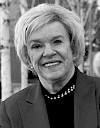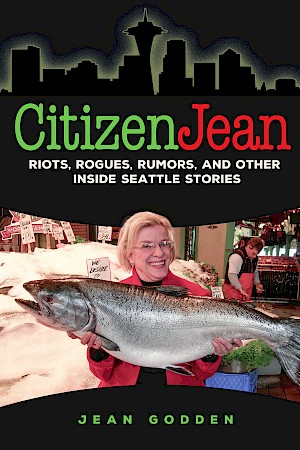Jean Godden
Jean Godden • Written January 2020

In her early years, there never was a time when Jean Godden, born into a nomadic military family, wasn’t on the move. Her dad, Morey Hecht, was an officer in the U. S. Coast and Geodetic Survey, charged with making maps and charts for the government. Her mother, Bunny Warvel, kept a list of places where they’d lived (in the early years they moved every two weeks!). By the time they reached Seattle, Bunny had listed 116 cities and towns.
The family first stayed in the Ravenna neighborhood with the Johnsons, another Coast Survey family. For the then Jean Hecht, who’d just graduated high school, that visit lasted only days, since she already was enrolled in Northwestern University.
Jean spent two years studying at Northwestern’s Medill School of Journalism and working on the Daily Northwestern. Home for the Summer, she lucked into a job as news editor for the University District Herald. Instead of returning to school, Jean stayed on at the Herald, thinking she would complete a journalism degree less expensively at the University of Washington.
Plans sometimes go awry. Jean fell in love with and married Robert (Bob) Godden, a commercial artist who worked with Don and Warren Kraft and later for Kraft Smith & Ehrig. Jean’s newspaper career was put on hold after the arrival of her first son and then another. It wasn’t until her children reached school age that she was able to pursue a degree.
In the interim, Jean worked part-time as her artist husband’s bookkeeper. Bob had partnered with Ross Swift, another artist, to form an agency they called Omniarts. The partners worked on projects that included the Seattle World’s Fair. Bob also created the logo for a startup drive-in known as Dick’s. And his drawings of vintage cars at Dick’s is used to this day.
Meanwhile, Jean worked on community projects. When her elder son’s kindergarten class was cancelled following a levy failure, Jean helped organize a cooperative kindergarten. That led to her election as PTA president. She also served as a board member for the League of Women Voters and Citizens Against Freeways.
After getting that elusive degree in 1974, Jean landed a job at the Seattle Post-Intelligencer, where she worked as an urban affairs reporter, editorialist, business editor, restaurant critic and finally as a city columnist. In the 1990s, the Seattle Times made an offer and she took her column to the region’s largest daily paper.
On July 31, 2003, after 20 years as a city columnist, Jean abruptly quit to run for Seattle City Council. She was elected 100 days later, defeating an incumbent and five male challengers. In her three terms on the Council, she chaired the Energy and Environment, Finance and Budget, Parks and Recreation and Waterfront committees, as well as committees overseeing public utilities, libraries and gender equity.
Today, she signs copies of her book, “Citizen Jean: Riots, Rogues, Rumors and Other Inside Seattle stories.” She and Sue Donaldson, another former councilmember, co-host a weekly radio show on 101.1 FM. Jean also writes a weekly opinion column. She says, “I’ve come full circle. I began my career at a community newspaper and now enjoy writing for Westside Seattle, a combination of four community weeklies.”
She asks, “What could be better than having two careers, one as a witness recording city history being made and a second one participating in making history? Seattle is my adopted city, the only one where I have roots. It has skyrocketed, going from a remote waystation to a leader in civic and national affairs. What is happening in Seattle today shapes tomorrow’s world.
As one reaches and passes the three-score and 10 mark, there's a wonderful freedom in believing that, even when mistakes were made, luck and timing played large roles in my drama.
I was lucky enough to be born into the second and third generation of families just off the boat. These were families who believed that getting ahead meant acquiring an education. One grandfather, a first-generation farmer, had insisted all seven of his children attend college or university. It was assumed that one would get a degree. And, although I left school early, I had reoccurring dreams that I was taking a test without proper preparation. It wasn't until I finally had that diploma that I could rest easy.
One of the roles timing played was that, although we were far from the MeToo era, women were equipped with a vote and were no any longer pariahs in the workplace. I profited from many mentors and role models along the way. First was John Heitzman, editor of the University Herald, who hired me on faith for my first newspaper job and gave me freedom to make mistakes. I made some beauties. A father had ordered 200 extra copies of the edition that would cover his daughter's wedding. How could I ever have headlined the story about the rites at "St. Stevens?"
Another to whom I owe much was Seattle Post-Intelligencer editorial page editor Ruth Howell. Ruth was a fireball who could and did use the "f" word in every part of speech. She came in each morning with her purse clutched under one arm like a football, equipped either with complaints or compliments for the look of the opinion pages. In the months that I worked for her, I learned how to make an opinion page lively. Did you write your "shoot the squirrels" editorial today?
What else I learned along the way was to know when it was time to take the next step, the daring to go from the ease of editing opinions of others, to making comments of my own, writing a four-day-a-week column. When I began the column, I gave the paper's editor a list of items I might cover. After eight years of columns, I took most of that list, still untouched, to The Seattle Times and another job writing four times a week. There was always more than enough tales to fill an 800-word space.
Deciding to leave The Seattle Times after 12 years as a chronicler of events at the city, to step into politics with no assurances, took as much nerve as I could summon. Along the way, I had helpful advice, first from Cathy Allen, a political consultant who sometimes took on hardship cases. Did I have a chance facing a young Seattle city councilmember and five other challengers, all guys? I couldn't have done it without the expert help of half a dozen helpers from Tamara Wilson, who threw away my newspaper trench coat and dented my Nordstrom card, to Lorraine Howell, who taught me to project my voice while lying on the floor, flat on my back.
Luck, timing and an incumbent's casual attitude toward ethics put me on the Seattle City Council and helped me win reelection to two more terms. The wonderful gift of timing gave me issues to work on—the nation's largest gender pay gap and the need to pass paid sick leave and paid parental leave.
When retired, I was able to pen the book I'd always meant to write—I enclose the cover below. Luck gave me Beth DeWeese, a wonderful editor at the Washington University Press who insisted that I change the working title that I'd liked ("Confessions of a Bad-Assed Bitch") to something she believed more fitting. She was right, of course. Now with that first book, "Citizen Jean," behind me, I am free to work on stories I still haven't told. With luck and timing, there may be a sequel. May we always be granted a second act or two.
